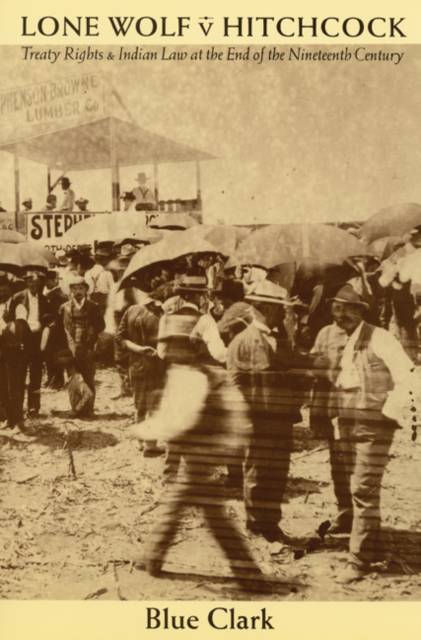
- Retrait gratuit dans votre magasin Club
- 7.000.000 titres dans notre catalogue
- Payer en toute sécurité
- Toujours un magasin près de chez vous
- Retrait gratuit dans votre magasin Club
- 7.000.0000 titres dans notre catalogue
- Payer en toute sécurité
- Toujours un magasin près de chez vous
Description
In 1892 the Kiowas and related Comanche and Plains Apache groups were pressured into agreeing to divide their land into allotments under the terms of the Dawes Act of 1887. Lone Wolf, a Kiowa band leader, sued to halt the land division, citing the treaties signed with the United States immediately after the Civil War. In 1902 the case reached the Supreme Court, which found that Congress could overturn the treaties through the doctrine of plenary power.
As he recounts the Lone Wolf case, Clark reaches beyond the legal decision to describe the Kiowa tribe itself and its struggles to cope with Euro-American pressure on its society, attitudes, culture, economic system, and land base. The story of the case therefore also becomes the history of the tribe in the late nineteenth century.
The Lone Wolf case also necessarily becomes a study of the Dawes Allotment Act of 1887 in operation; under the terms of the Dawes Act and successor legislation, almost two-thirds of Indian lands passed out of their hands within a generation. Understanding how this happened in the case of the Kiowa permits a nuanced view of the well-intentioned but ultimately disastrous allotment effort.
Spécifications
Parties prenantes
- Auteur(s) :
- Editeur:
Contenu
- Nombre de pages :
- 198
- Langue:
- Anglais
- Collection :
Caractéristiques
- EAN:
- 9780803264014
- Date de parution :
- 01-11-99
- Format:
- Livre broché
- Format numérique:
- Trade paperback (VS)
- Dimensions :
- 155 mm x 228 mm
- Poids :
- 322 g

Les avis
Nous publions uniquement les avis qui respectent les conditions requises. Consultez nos conditions pour les avis.






